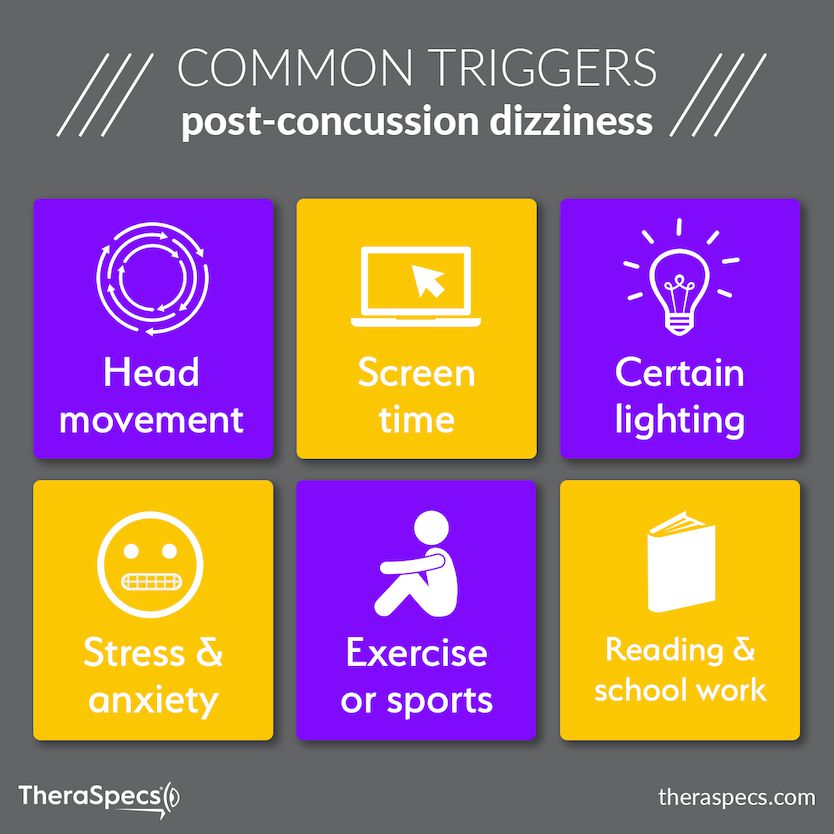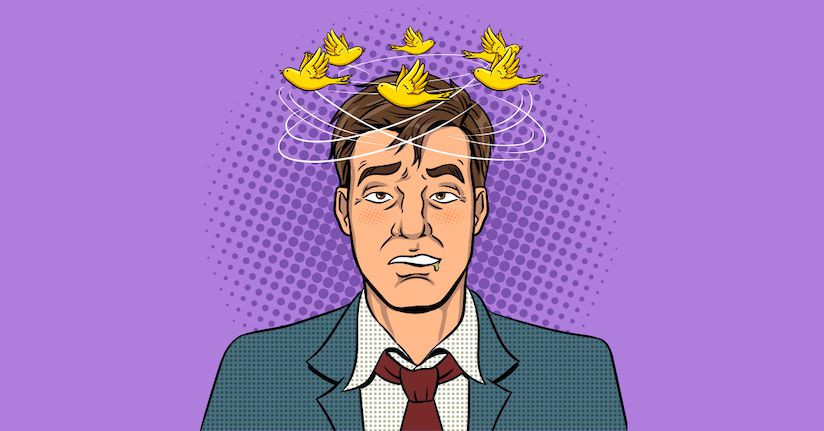Dizziness and Vertigo from Post-Concussion Syndrome
Post-concussion syndrome can be a persistent problem for people with a head injury, but what are some of those symptoms that one might expect? We have previously explored post-concussion headaches, but in this article we’ll look at another common symptom: dizziness and vertigo.
Symptoms and diagnosis of dizziness in post-concussion syndrome
Acute dizziness is a commonly-reported problem following concussion, so much so that there are multiple clinical definitions that include it as an identifying sign of post-concussion syndrome.2 However, it can be incredibly difficult to properly diagnose post-traumatic dizziness and vertigo for several reasons, including:
- Latency of symptom onset
- Presence of other dizziness-related side effects
- Difficulty of patients in describing symptoms
- Other causes or conditions of vertigo
Evidence has suggested that up to 80% of those who sustain a concussion frequently report vertigo in the first few days after a head injury, and it can often last up to a week or more. On the other hand, post-concussive dizziness can persist for weeks or months after the trauma, and even become a chronic problem in one out of five patients—with some reporting symptoms for 2 to 5 years or even longer.3
Dizziness is not just limited to the sensation of “spinning” either. Other symptoms and side effects might include: lightheadedness; vertigo; motion sensitivity; balance dysfunction; feeling faint or blacking out; double vision and other eye symptoms after concussion; nausea and vomiting; and more.
Causes of dizziness after a concussion

The symptom of feeling dizzy after head trauma rarely occurs in isolation; instead multiple factors often contribute to the problem.18 There is much question over exactly what are the root causes of post-concussion dizziness, and each patient has unique experiences that must be considered. However, experts agree that the most common reason is benign paroxysmal positional vertigo, which is likely due to damage to the inner ear and may be responsible for 60% of cases.16 However, other causes have emerged, such as:3-5,17
- migraine or vestibular migraine
- central vestibular system damage
- central nervous system dysfunction
- accompanying neck or whiplash injury
- labyrinthine concussion (damage to the inner ear)
Evaluation by a qualified healthcare provider is necessary to determine the cause of the prolonged nature of the symptoms. As with any medical condition, there may be more than one reason that a person experiences dizziness and vertigo.
Common triggers of post-concussion dizziness
Generally speaking, there are a variety of triggers or things that can that can bring about an episode of vertigo and dizziness. Some common triggers include:7,8
- Certain head movements
- Medications
- Anxiety and/or stress
- Dehydration
- Prolonged bed rest
- Migraines
- Certain patterns
- Lights, especially flickering lights

In addition, a recent observational study noted that computer screens and television triggered dizziness in half of adolescents who had endured a sports-related concussion; this is an anecdote that has been reported by numerous patients in clinic and online social communities.13,14 It is thought that these triggers are associated with eye movement and motion sensitivity, and the light from these screens may also lead to the onset of post-concussion symptoms—particularly if migraine-like symptoms are prominent after the concussion.
Another study found that younger children with a diagnosis of concussion are more susceptible to visually-induced dizziness.15 These environmental triggers included:
- Completing school work
- Sports participation
- Computer use
- Riding in a car or bus
- Watching TV or cinema movie
- Looking at a striped or moving surface
It is important to speak with your healthcare provider for evaluation of your dizziness or vertigo so that an accurate diagnosis can be made and a list of avoidable triggers can be discussed and developed.
Prognosis and outcomes
Post-concussion syndrome prognosis depends on a variety of factors, however for most people, symptoms resolve within one year of the inciting injury.9 However, as we noted previously, dizziness can last for several years, ultimately disrupting patients’ lives. In fact, dizziness and vertigo have been linked to psychological distress, work-related disability and prolonged recovery duration for those with post-concussion syndrome.6,10,19
Not surprisingly, other chronic symptoms that occur after a concussion (such as headaches or anxiety) have been associated with higher instances of vestibular and balance dysfunction.11 The type of head trauma also makes a difference in the outcomes experienced by patients; specifically, dizziness that stems from blast-induced injuries among military members has been shown to get worse over time.12
Treatment of post-concussion syndrome dizziness and vertigo
It is imperative that patients be evaluated for all symptoms after a concussion, in order to identify other possible causes of dizziness. Some treatment options to better manage post-traumatic vertigo and concussion-related dizziness include:1,9,20
- Physical and cognitive rest
- Anti-vertigo or anti-nausea medications
- Migraine-specific treatments (if migraine-associated vertigo is also suspected)
- Minimizing other environmental triggers, such as screen time
- Gradual activity increases
- Canalith repositioning procedure- a physical therapy maneuver used in cases where the gravity-sensing ear crystals have been dislodged during the precipitating injury.
- Exercise-based vestibular rehabilitation
Read More:
Vestibular Migraine: The Effects of Migraine Vertigo and Dizziness
Post-Concussion Syndrome Headaches
7 Common Eye Symptoms after Concussion
References:
1Willer, B and Leddy, JJ. Management of Concussion and Post-Concussion Syndrome (2006) Current Treatment Options in Neurology 2006, 8:415–426.
2Leddy JJ, Sandhu H, Sodhi V, Baker JG, Willer B. Rehabilitation of Concussion and Post-concussion Syndrome. Sports Health. 2012;4(2):147-154. doi:10.1177/1941738111433673.
3Sharp, DJ., and Jenkins, PO. Concussion is confusing us all. (2015) Pract Neurol. 2015 Jun; 15(3): 172–186.
4Fife, TD., and Giza, C. Posttraumatic vertigo and dizziness. (2013) Semin Neurol. 2013 Jul;33(3):238-43.
5Lee, SC., Vestibular System Anatomy (2016, June 27). Retrieved from https://emedicine.medscape.com/article/883956-overview.
6Heyer, GL., Young, JA., and Fischer, AN. (2017) Lightheadedness After Concussion: Not All Dizziness is Vertigo Clin J Sport Med. 2017 Jul 11.
7Avoiding Vertigo Triggers. (2017, May 15) Retrieved from https://di-vertigo.com/2017/05/avoiding-vertigo-triggers/
8Gibbs, B. 5 Vertigo Triggers That You May Not Be Aware Of. (2016, July 5) Retrieved from http://www.curevertigonow.com/vertigo-triggers/
9Treatment and prognosis for post-concussion syndrome. (2017, August 15). Retrieved from: http://elizabethsandelmd.com/2017/08/15/treatment-prognosis- post-concussion- syndrome/
10Marzo SJ, Leonetti JP, Raffin MJ, Letarte P. Diagnosis and management of post-traumatic vertigo. (2014) Laryngoscope. 2004 Oct;114(10):1720-3.
11Register-Mihalik JK, Mihalik JP, Guskiewicz KM. Balance deficits after sports-related concussion in individuals reporting posttraumatic headache. Neurosurgery. 2008 Jul;63(1):76-80; discussion 80-2. doi: 10.1227/01.NEU.0000335073.39728.CE.
12Hoffer ME, Balaban C, Gottshall K, Balough BJ, Maddox MR, Penta JR. Blast exposure: vestibular consequences and associated characteristics. Otol Neurotol. 2010 Feb;31(2):232-6. doi: 10.1097/MAO.0b013e3181c993c3.
13Reneker JC, Cheruvu V, Yang J, et al. Differential diagnosis of dizziness after a sports-related concussion based on descriptors and triggers: an observational study. Injury Epidemiology. 2015;2(1):22. doi:10.1186/s40621-015-0055-2.
14Lynch JM, Anderson M, Benton B, Green SS. The Gaming of Concussions: A Unique Intervention in Postconcussion Syndrome. Journal of Athletic Training. 2015;50(3):270-276. doi:10.4085/1062-6050-49.3.78.
15Pavlou M, Whitney SL, Alkathiry AA, et al. Visually Induced Dizziness in Children and Validation of the Pediatric Visually Induced Dizziness Questionnaire. Frontiers in Neurology. 2017;8:656. doi:10.3389/fneur.2017.00656.
16Davies RA, Luxon LM. Dizziness following head injury: a neuro-otological study. J Neurol. 1995 Mar;242(4):222-30.
17Kolev OI, Sergeeva M. Vestibular disorders following different types of head and neck trauma. Functional Neurology. 2016;31(2):75-80. doi:10.11138/FNeur/2016.31.2.075.
18Reneker JC, Cheruvu VK, Yang J, James MA, Cook CE. Physical examination of dizziness in athletes after a concussion: A descriptive study. Musculoskelet Sci Pract. 2018 Apr;34:8-13. doi: 10.1016/j.msksp.2017.11.012. Epub 2017 Nov 26.
19Alsalaheen BA, Mucha A, Morris LO, Whitney SL, Furman JM, Camiolo-Reddy CE, Collins MW, Lovell MR, Sparto PJ. Vestibular rehabilitation for dizziness and balance disorders after concussion.J Neurol Phys Ther. 2010 Jun;34(2):87-93. doi: 10.1097/NPT.0b013e3181dde568.
20Chamelian L, Feinstein A. Outcome after mild to moderate traumatic brain injury: the role of dizziness. Arch Phys Med Rehabil. 2004 Oct;85(10):1662-6.
TheraSpecs Glasses for Light Management
Try our light-filtering glasses and stay protected against harsh light from screens, fluorescents, LEDs, unwanted blue light, bright sunlight, flashing lights, and more.





